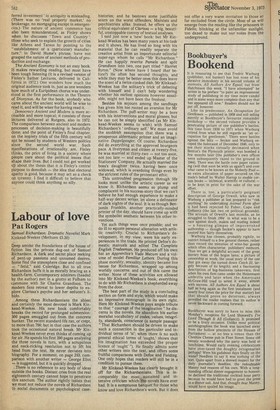Bookbuyer's
Bookend
It is reassuring to see that Fredric Warburg (publisher, not banker) has lost none of his abrasive immodesty in his second volume of memoirs, All Authors Are Equal, out from Hutchinson this week. "I have attempted" he writes in his preface "to paint an impressionist study of publishing in my time more candid and in some ways more complete than any that has appeared till now." Readers should not be put off, however.
Like its predecessor, An Occupation for Gentlemen — published in 1959 and still selling merrily at Bookbuyer's favourite remainder bookshop — the second volume provides a penetrating picture of one publisher's battles, this time from 1939 to 1971 when Warburg retired from what he still regards as "an occupation for gentlemen." There were battles against the blitz — Sucker and Warburg escaped the holocaust of December 1940, only to see their stocks virtually decimated when Benton's the Plymouth printer, was bombed a few months later (the publisher's own offices were subsequently razed to the ground, in 1944). There was the battle over paper rationing (will that soon be with us again?) and over what came to be known as the Moberly Pool — an extra allocation of paper secured on the trade's behalf by Walter Harrap to enable certain books — technical, scientific or cultural — to be kept in print for the sake of the war effort.
There is, too, a particularly poignant description of George Orwell, who saw in Warburg a publisher at last prepared to "risk anything" by undertaking Animal Farm after it had been rejected by Faber, Cape and Gollancz (the last two on political grounds).
The account of Orwell's last months, as he struggled to finish 1984 in what was to be a
race against death, makes sad reading indeed — a haunting glimpse of impoverished authorship — though Secker's appear to have treated him fairly themselves.
Warburg has chosen, probably rightly, to restrict himself to a few general themes, rather than record the minutiae of wine-bar gossip which often characterise publishers' memoirs. Thus we get a delightful account of the great literary hoax of the bogus lama; a picture of
censorship at work; the usual story of the one that got away (he turned down Catch 22, largely because of its length); and a fascinating description of big-business takeovers, first
when his own firm came under the Heinemann umbrella and later when the Americans McGraw-Hill tried to wrest it away, almost
with success. All Authors Are Equal is about
half as long again as the first instalment (and nearly four times the price for that matter) but that should prove no deterrent, always provided the reader realises that its author is never backward in coming forward.
Bookbuyer was sorry to have to miss this Monday's reception for Lord Shinwell's I've Lived Through It All (Gollancz). It promised to be a lively occasion. Unlike most political autobiographies the book was launched away from the hollow precincts of the Houses of Parliament — at no less a venue than the Cheshire Cheese pub in Fleet Street. Some old sweats wondered why the party was held at lunchtime. Would early evening celebrations have over-taxed the doughty octogenarian perhaps? Were his gadabout days finally on the wane? Needless to say it was nothing of the sort. Quite apart from a shrewd respect for the daily journalist's deadline, the redoubtable Manny had reasons of his own. With a long standing official dinner engagement to honour, he declined the traditional cocktail hour party
because he would have had to greet the press in a dinner suit. And that, thought dear Manny, would have spoiled his image.


































 Previous page
Previous page